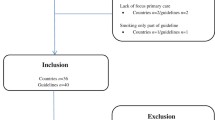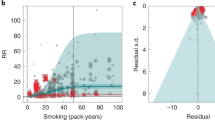Abstract
The idea that it is better for doctors to say something than not to say anything about smoking to their patients sounds tautological. And yet there is a very strong feeling among doctors that just asking smokers about their smoking or simply advising them to stop is not enough. Is there a fine line between what is enough and what is not? Can we identify it?
Access this chapter
Tax calculation will be finalised at checkout
Purchases are for personal use only
Preview
Unable to display preview. Download preview PDF.
Similar content being viewed by others
References
Russell MAH, Wilson C, Taylor C, Baker CD. Effect of general practitioners’ advice against smoking British Medical Journal, 1979, 2:231–235.
Stewart PJ, Rosser WW. The impact of routine advice on smoking cessation from family physicians. Canadian Medical Journal, 1982; 126:1051–1054.
Cummings SR, Coates TJ, Richard RJ, Hansen B, Zahnd EG, VanderMartin R, Duncan C, Gerbert B, Martin A, Stein MJ: Training physicians in counseling about smoking cessation. A randomized trial of the “Quit for Life” Program. Annals of Internal Medicine 1989; 110:640–647.
Wilson DH, Wakefield MA, Steven ID, Rohrsheim RA, Esterman AJ, Graham NMH. “Sick of Smoking”: evaluation of a targeted minimal smoking cessation intervention in general practice. Medical Journal of Australia, 1990, 152:518–521.
Slama K, Redman S, Perkins J, Reid ALA, Sanson-Fisher RW. The effectiveness of two smoking cessation programmes for use in general practice: a randomised clinical trial. British Medical Journal, 1990, 300:1707–9.
Fowler G. Conseils anti-tabagiques prodigués par des infirmières en cabinets de groupe de médecine générale: un essai randomisée en Angleterre. In K. Slama, S. Karsenty, A. Hirsch (Eds) La Lutte Anti-tabagique Est-elle Efficace?, Paris, Editions INSERM, 1992.
Hollis JF, Lichtenstein E, Vogt TM, Stevens VJ, Biglan A. Nurse-assisted counseling for smokers in primary care. Annals of Internal Medicine, 1993; 118:521–525.
Prochaska JO, DiClemente CC. Transtheoretical therapy: Toward a more integrative model of change. Psychotherapy: Theory Research and Practice, 1982, 19:276–288.
DiClemente CC, Prochaska JO. Self-change and therapy change of smoking behavior: A comparison of processes of change in cessation and maintenance. Addictive Behaviors 1982, 7:133–142.
Copeman RC, Swannell RJ, Pincus DF, Woodhead KA. Utilization of the “Smokescreen” smoking-cessation programme by general practitioners and their patients. Medical Journal of Australia,1989; 151:83–87.
Frank E, Winkleby MA, Altman DG, Rockhill B, Fortmann SP. Predictors of physicians’ smoking cessation advice. Journal of the American Medical Association, 1991; 266:3139–3144.
Dickenson JA, Wiggers J, Leeder ST, Sanson-Fisher RW. General practitioners’ detection of patients’ smoking status. Medical Journal of Australia, 1989; 150:420–426.
Evert CK, Li VC, Coates Ti. Increasing physicians’ antismoking influence by applying an inexpensive feedback technique. Journal of Medical Education, 1983; 58:468–473.
Kottke TE, Brekke ML, Solberg LI, Hughes JR. A randomized trial to increase smoking intervention by physicians. Doctors Helping Smokers, Round 1. Journal of the American Medical Association, 1989, 261:2101–2106.
Slama K, Karsenty S, Hirsch A. Effectiveness of minimal intervention by general practitioners with their smoking patients: a randomised controlled trialin France. Tobacco Control (in press).
Author information
Authors and Affiliations
Editor information
Editors and Affiliations
Rights and permissions
Copyright information
© 1995 Springer Science+Business Media New York
About this chapter
Cite this chapter
Slama, K. (1995). The Effect of Doctors’ Advice. In: Slama, K. (eds) Tobacco and Health. Springer, Boston, MA. https://doi.org/10.1007/978-1-4615-1907-2_97
Download citation
DOI: https://doi.org/10.1007/978-1-4615-1907-2_97
Publisher Name: Springer, Boston, MA
Print ISBN: 978-1-4613-5779-7
Online ISBN: 978-1-4615-1907-2
eBook Packages: Springer Book Archive




